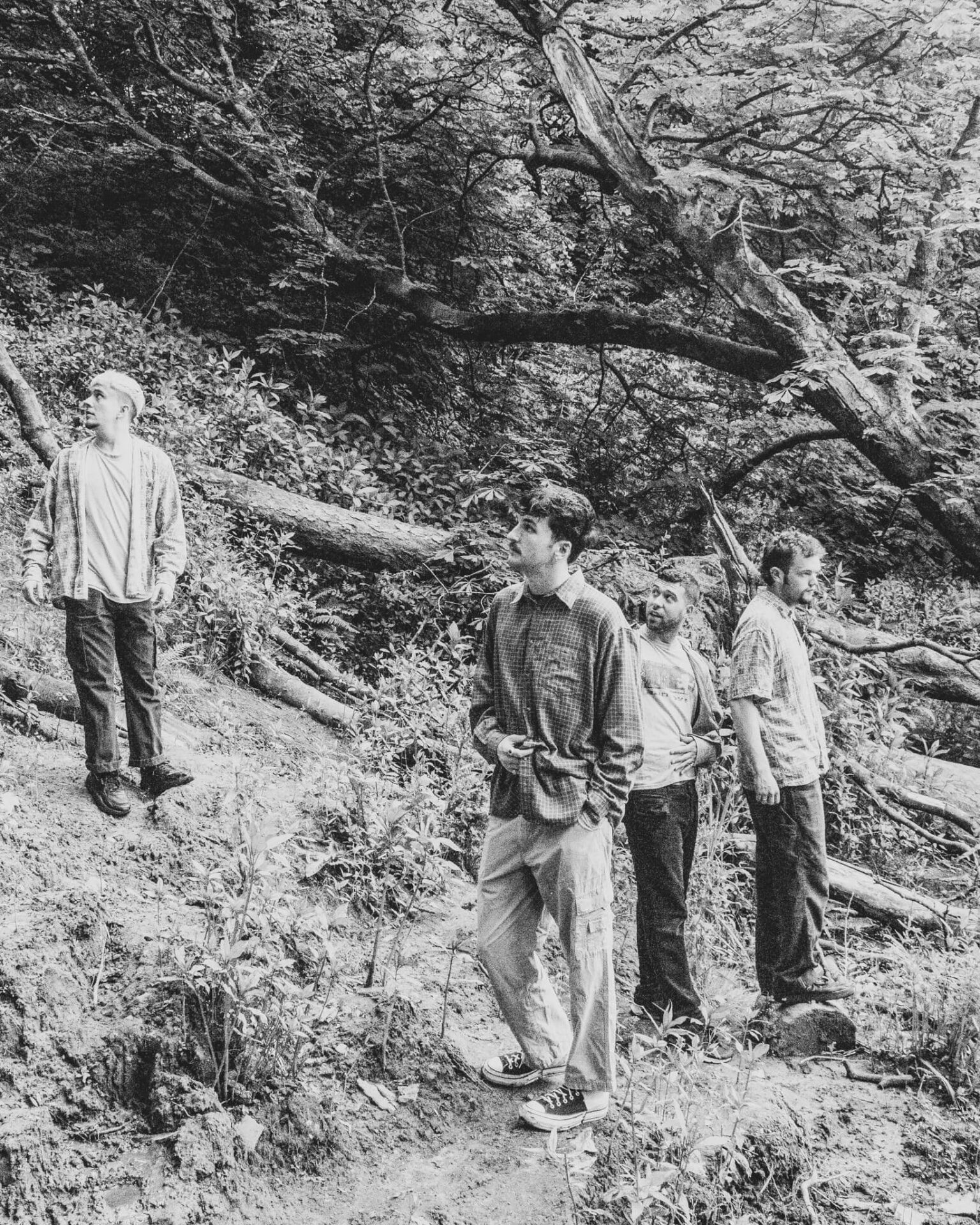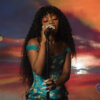With release of new single ‘Thunder‘ and after seeing the band perform a storming set on the last night of Left of the Dial festival in Rotterdam I was keen to find out more about the Manchester jazz punks Maruja. Harry Wilkinson (lead vocals and guitar), Joe Carroll (alto saxophone and vocals), Matt Buonaccorsi (bass) and Jacob Hayes (drums) joined me over zoom for a conversation.
Congratulations on new single ‘Thunder‘. I understand you sent this to Dan Carey at Speedy Wunderground. Can you share his response?
Jacob: We sent it to him at the start of 2020. I was doing my exams at university and was procrastinating like a madman. So I did some research on Speedy Wunderground. I sent it through to Dan Carey and spoke to Pierre Hall quite a lot. We sent them ‘Tao‘ which we put out only two months later, and ‘Thunder‘ which was quite different then. When we initially sent it he said this sounds sick, it sounds like a wild jam. And then at the end of 2021 they came to the Independent Record Fair at Exchange Square in Manchester, and we managed to chat with them. They were like that song sounds crazy, it sounds like ‘Bitches Brew‘ (Miles Davis). Dan heard it at its very initial stages. He came back to us and said he really liked it but he wanted it to sound less of a jam and have words to it. It was more of a demo at that point.
Could I start by asking you how the four of you came together to play music?
Harry: It started out with me and Matt. The line-up’s changed quite a lot over the years.
It started out with me and a friend of mine called Liam. I’d written some songs that he liked and respected and he wanted to start a band around these songs. Liam knew Matt as they were in same class at college. We got together and a couple of jams, we also had a drummer at that point. We had a couple of years with that line-up. Then enter Joe, which was a cool decision. After that we realised that the drummer wasn’t dedicated enough and so we had to get rid of him which made space for Jacob. Jacob had just so happened to move in next door to my best mate at university. When we lost the drummer Jacob said he played drums. So I said let’s go for a jam. It was us five including Liam. But Liams tastes weren’t in line with ours and we grew apart. For the past 3 or 4 it’s been us four and this is the line-up it was always supposed to be.
Joe: The first song we wrote together was ‘Tao‘. Before then we had almost an album’s worth of material which we removed as it doesn’t represent where we are musically. Now we’re a four-piece it feels like its a complete thing, and it’s own thing. Even though there is a lot of influences it feels like it’s got its own soundnow.
As a listener you have such a mixture of genres in your music. Did you always have this jazz punk sound or did it evolve to that place?
Harry: It evolved to that place, back in the day it was different – it was more indie and rock based.
Joe: It was still a lot of funk, or reggae or jazz influenced, it was always pretty leftfield.
Harry: It was always an eclectic mix of different genres but now we’ve honed in. I think it’s mainly because we improvise so much together now. We are so comfortable playing together, what comes out of us is authentic. We are all influenced by so many different genres, that comes out in our playing, because we improvise so much together all of those influences come through.
Joe: And with that the thing about jazz and punk although they seem to be quite different they have a lot of similarities. Punk is a lot about frustration, a big ball of energy. And jazz is very freeform you can do anything. Improvising together we’ve got a lot of energy and we are very passionate about what we do which is like the punk side coming through and then the jazz is a lack of boundaries and playing wanting to play whatever we want to play.
Can you talk me through how you create your songs?
Harry: They are mostly derived from jams. We’ll get together and jam for about an hour and a half every time we get together and out of that there are so many parts which are strong that we could turn into songs so then it’s a case of being quite selective and sacrificial with them. Which one is giving us the most emotional reaction because that’s the one we should go with. We’ll try and reflect the energy of that in a live track in a live performance and in a written song. Sometimes it will be five minutes in that jam we’re going to use that. ‘The Tinker‘ is like that, it’s derived straight from a jam. We went into the studio and recreated it, put some overdubs on it and it was done. Sometimes on other tracks it’s like that bassline is great but what we’ll do is evolve from that and write ontop of that. Then I might take it away, write some lyrics and put some lyrics to it. We’ll also be conscience of where we can have lyrics. It’s a work in progress like that.
Joe: In terms of the structures none of us are jazz trained so the songs are based on improvisation and what’s coming out of us naturally. It’s not like we’re doing verse chorus verse chorus because that’s the formula. It’s all just stuff that we’ve learnt from playing together that we think sounds good.
Jacob: For the two singles that we put out this year ‘Blind Spot‘ and ‘The Tinker‘ we have got the original jams they came from on soundcloud. We’ll put the one up for ‘Thunder‘ pretty soon as well.
Harry: In the future we hope to do a fully improvised live album as well as written music. If you hear the jam where the songs have come from. If you listen to the song and you unveil the mask behind that is where the jam lies. It’s an even more honest representation of where the ideas are spawned for our music. We love listening back to them. You always get little ideas. We’re listening back and learning from ourselves. When we enter that state of mind we enter a flow state. None of us really remember the jams that we do, we might remember a riff here or there but most of the time are completely immersed in what we are doing so it is so important to study it, listen back, take it apart, understand what it is and try and define it in a song.
Your music does not seem to play by any rules with regards to the lyrics. You don’t seem to feel the need to pack your song with lyrics.
Harry: A lot of that comes from us jamming. A lot of the time I will improvise vocals on top. We’re not about just making this as a backing for the vocals. We understand we move as a unit, what’s necessary at that part, is it for lyrics or is it for the sax eg? People are into different genres these days and they are not going to be deterred by the fact it’s not vocal lead all the time. We’re always want to represent what’s right for the music, for that song. So a lot of the time we’ll write the song and I’ll take it away and write some lyrics on top where I think they should be. Spoken word or rap or song or melody whatever it is we’ll decide what it has to be and I’ll go away and write it.
Joe: The next track we have coming out as the last track off the four track EP. As we were jamming it, we were in that flow state and everyone is so involved and immersed in it. Harry starting wailing out these vocals. Then the lyrics might then fit into those noise parts. The way the vocals sat and just kept rising with the music it was so emotive and almost pain stricken, they became the basis for the vocals. So he went away and wrote lyrics for that.
Sadly you were robbed but Louis Tomlinson quietly donated £4,000. Can you tell me how you found out?
Matt: Jacob and I used to live in the same house together. At the time we had recorded demos for the new songs that were coming out and we got all the stems and individual parts sent to us. Then I was mixing it on the laptop and me and Jacob were looking at it together. Then all of a sudden we’re getting these notifications coming through, Joe and Harry are saying “We’ve just received £4k from some guy named Louis Tomlinson, who has taken the One Direction guys name. That’s not going be him right?”. Then the actual Louis Tomlinson started following us on twitter. We still didn’t believe any of it was real, then it finally sinks in.
Jacob: It was kind of ironic thing that it was after that recording session, that night we got robbed and it was the same session that we were mixing when we got the notification through. It was because of that session we got robbed, and whilst we were editing it we got the money through.
Harry: That kind of stuff is quite inspiring. I think the whole idea of people being famous and superstars, and they get fucked up every night on tour, that whole perception of what a rock n roll star is is outdated. At the moment the music industry is struggling especially for up and coming artists. If someone is in a position of power and responsibility, which they are because of their status and influence they have on culture I do think it is their responsibility to offer support to up and coming artists. That’s what I hope we do when we get to a level, to offer support to up and coming artists. You are responsible to help in a struggling industry and I think that is what is cool these days, not being a dickhead who sniffs drugs every night.
At your set at Left of the Dial, Festival in Rotterdam there was a collective “No” when you said it was your last song. Can you put into words what it means to you to play your music to an audience?
Matt: You can tell now I’m struggling to find the words. When you get to play at somewhere like Left of the Dial, that was our first European show. It was different to the UK because we’ve had gigs in the UK where people would not be bothered. We played a gig once supporting an Oasis tribute band and it was the most lacklustre audience experience we’ve ever had. We found it so funny with them all in their bucket hats saying “Who are these guys? We want to see Oasis!”. We’re sick to death of that in Manchester. We’re trying to write fresh stuff pushing boundaries, it’s not from that era that people are trying to bring back constantly. So when we go to somewhere like the Netherlands and without even playing the first song people are just roaring with applause and after the first few songs they’re just eating it up. It’s at that point that words fail, they don’t do it justice, it’s more of a feeling. I’m finding it hard to describe right now. You have that overwhelming sense of love for yourself and for other people – it’s that oneness, its palpable. You can really feel that onstage. Especially when the people watching you they care so much about what you’re doing, they are fully invested in you – it’s so rewarding. It’s the best feeling.
Jacob: We love the music we make. We jam all the time and we love playing live, and it’s great to hear that people understand it and connect to it. We’re making the music that we want to hear. It’s good to know that we can go across borders and play to people who haven’t seen us before and they react and feel the same way.
Joe: We’re making stuff that doesn’t really sound like anything else. There is that thing will people understand it. Because when we play live its very emotional. When people do connect and understand it it’s extra special.
Harry: We’re just trying to represent our music, physically, through our emotions and how we portray ourselves on stage. We’re trying to give our music the justice it deserves, and that’s us being as really honest as possible. Letting yourself go onstage and addressing the audience because the songs have that energy and have that passion and the power. We’ve had some incredible reactions from people after we’ve played live. I’ve seen the reaction from people, it brings something out, they let themselves go. Thats an amazing feeling. It’s allowing people to express themselves. They see us doing it and they think they’re going to go for it as well. It’s a great thing to emulate and to see it being reflected in audiences it’s a dream come true. We always wanted to hit that stage where we had a set that has an effect like that and we think we’re there. It’s an incredible feeling. Big ups anyone who comes and sees us live and shows us love, we’re going to show it back.
Jacob: I feel like we don’t know any other way to play we just go hell for leather every time. It’s that cathartic experience. We want to destroy it every time we play.
And congratulations on selling out your first headline date at Yes, Manchester on Friday 18 November. And you mentioned you have an EP coming out. What are the plans looking ahead into 2023?
Harry: We have the EP coming out. We’re hoping for some tour and festival slots, to get on the road a bit more. And hopefully releasing more music. We’ve got quite a lot in the vault ready to go and we’re going to be getting into the studio soon.
Maruja play their debut headline gig at Yes, Manchester on 18 November and it is sold out.
For more information on the band please check out their facebook and twitter.




